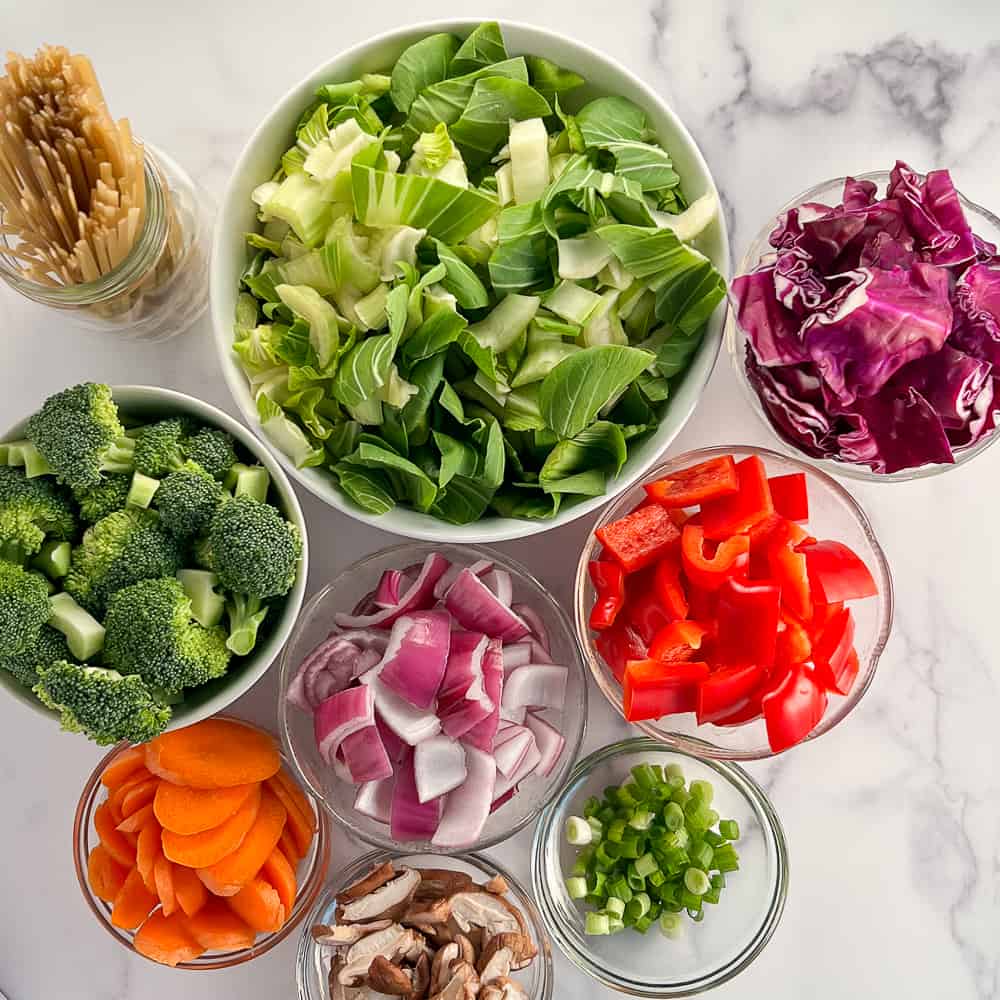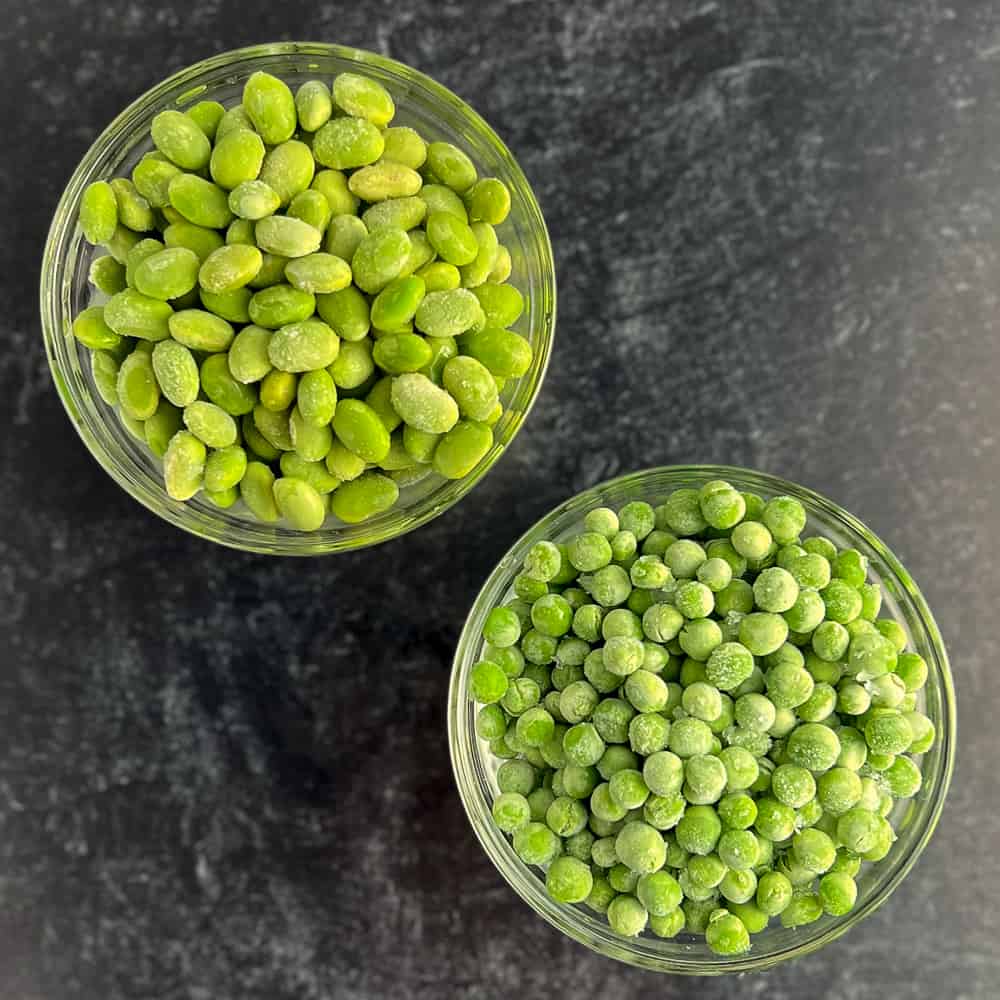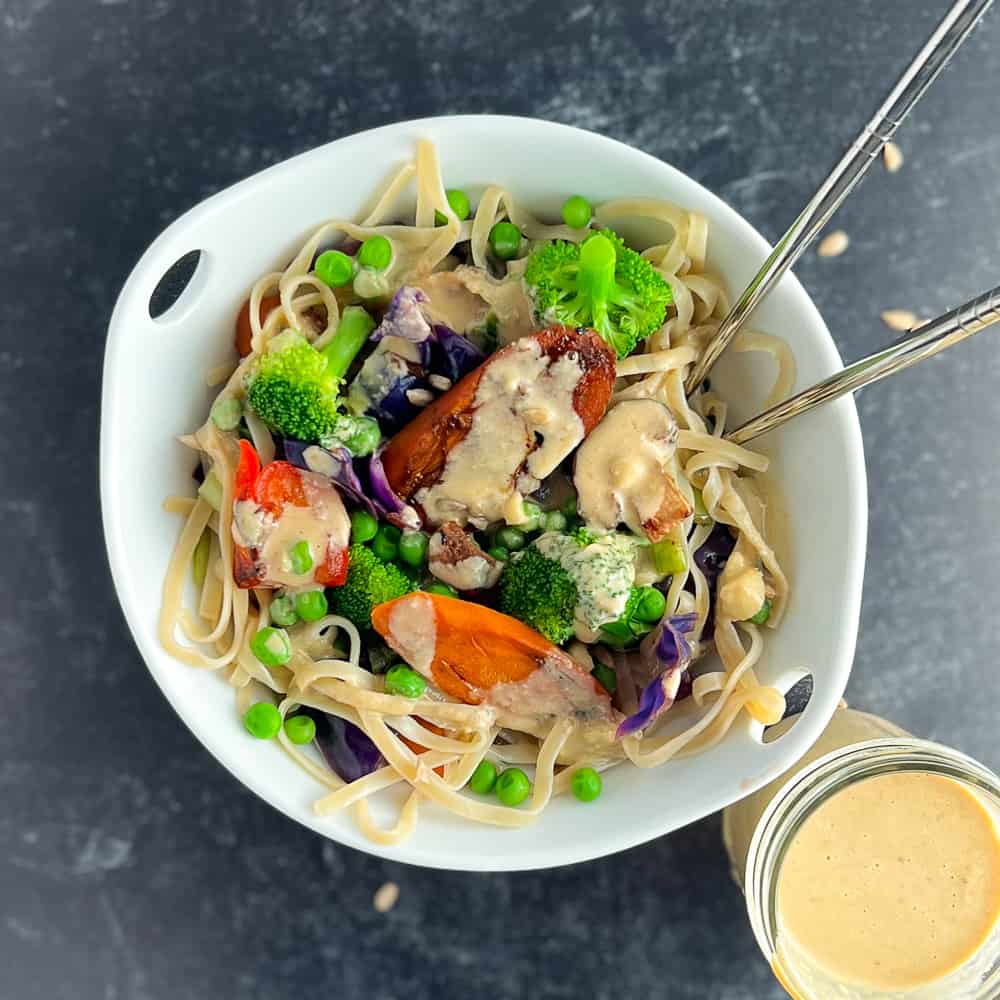Veggie Stir Fry with Noodles has 11 key ingredients
- Brown rice noodles
- Baby bok choy
- Purple cabbage
- Broccoli
- Red bell pepper
- Red onion
- Carrot
- Mushrooms
- Green onion
- Green peas, either fresh or frozen (or, if soy allergy is not present, edamame)
- Sweet and Tangy Sunflower Butter Sauce

Adding Legumes to Your Veggie Stir Fry
Including a legume along with the main vegetables will increase the dish’s protein and fiber content. For this allergy-friendly recipe, I used frozen green peas, but if you don’t have a soy sensitivity, shelled edamame works great.

- Bring a pot of water to a boil. Add rice noodles and cook according to package directions. To stop the cooking process, remove from the heat right away, drain, and rinse under cold water. This helps to avoid mushy noodles. I suggest cooking your noodles for a little less time than what the package suggests if you don’t mind them being al dente, or more chewy. I used a brown rice noodle called Pad Thai, which calls for five minutes of cooking. After four minutes, I removed it and gave it a good rinse in cold water. Its a personal preference. *[Note: your noodles may feel a little stiff after rinsing. Do not worry, they will soften nicely once the vegetables and sauce are added. ] .
- Heat a wok or a sizable sauté pan to a medium-high temperature. When the onion begins to brown, add it and cook it uncovered for three to four minutes. Add carrots, bell pepper, mushrooms, and cabbage. Toss to combine, then cook, uncovered, for an additional three to four minutes to caramelize. The veggies will stick, but thats okay.
- Using a firm spatula, mix the vegetables while scraping the brown bits from the pan’s bottom. Then add the baby bok choy. Cover the pan or wok and allow the baby bok choy to steam for three to four minutes.
- Add the chopped green onion, chopped broccoli, and frozen or fresh green peas. Cover again and let cook-steam for 3 to 4 minutes. Give the veggies a good stir and remove from heat.
- To serve, arrange the noodles in the bottom of the bowl, add the stir-fried vegetables, and then drizzle with the stir-frying sauce. Enjoy immediately!.

Special Note: Before beginning any fast, including the Daniel Fast, please consult your healthcare provider if you are experiencing any health problems. To provide your doctor with a list of foods that are allowed and prohibited during the Daniel Fast, simply copy and paste the contents of this page. Additionally, click here to view a list of recipes that will enable you to complete a 21-day Daniel fast.
I’ve updated the dietary recommendations after fielding hundreds of inquiries regarding the Daniel Fast. I’m hoping it will function as a more comprehensive list. The original list, which was used by a lot of people, was published in a fasting book. Although I am aware that the author did his best, it is not the same as receiving hundreds of questions asking for clarification. So here is the new list that I hope helps.
All vegetables. These can be fresh, frozen, dried, juiced or canned. Artichokes, asparagus, beets, broccoli, Brussels sprouts, cabbage, carrots, cauliflower, celery, chili peppers, collard greens, corn, cucumbers, eggplant, garlic, ginger root, kale, leeks, lettuce, mushrooms, mustard greens, okra, onions, parsley, potatoes, radishes, rutabagas, scallions, spinach, sprouts, squashes, sweet potatoes, tomatoes, turnips, watercress, yams, zucchini, veggie burgers are an option if you don’t have a soy allergy.
All fruits. These can be fresh, frozen, dried, juiced or canned. Apples, bananas, apricots, blackberries, blueberries, boysenberries, cantaloupe, cherries, cranberries, figs, grapefruit, grapes, guava, honeydew melon, kiwi, lemons, limes, mangoes, nectarines, oranges, papayas, peaches, pears, pineapples, plums, prunes, raisins, raspberries, strawberries, tangelos, tangerines, and watermelon are just a few examples of fruits.